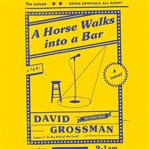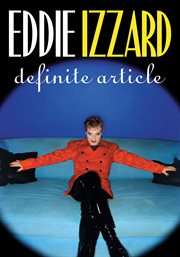Review by New York Times Review
A BROKEN MAN walks on stage and makes jokes for 194 pages. That's the shortest summary I can think of for David Grossman's magnificently comic and sucker-punch-tragic excursion into brilliance, his new novel, "A Horse Walks Into a Bar." Jewish humor is celebrated, and, these days, more necessary than ever. It is humor from the edge of the grave. Humor with a gun stuck in your ribs. Humor that requires nothing more than a match and a can of gasoline. And, of course, the willingness to set yourself on fire. Grossman's protagonist, the self-styled Dovaleh G, is ready for the flames. He addresses an audience hungry for jokes - though not of the political variety, they've had enough of that in Israel - in the basement club of the town of Netanya, which lies between Tel Aviv and Haifa. The first photo of Netanya on Wikipedia shows the intersection of two highways with some Minsk-looking apartment towers attached. As Dovaleh likes to say: "Nice city, Netanya." The audience for Dovaleh's act of selfimmolation is a cross-section of Israeli society: soldiers, bikers, gruff Likudniks, sensitive young women and two special guest stars from his childhood, a former judge with anger management issues and a dwarf village medium with a speech impediment. As Dovaleh unleashes the most heartfelt and terrifying stories of his life, the jokehungry audience rebels. "You wanna clear your head," one man cries before storming out, "and this guy gives us Yom Kippur." Comic novelists may understand Dovaleh's predicament all too well. Have I earned enough laughs to show you I'm this close to blowing my brains out, or do you want me to tell you the one about that horse who walks into a bar? Or, as another disgruntled audience member says: "Can you believe how he's using us to work out his hang-ups?" Dovaleh has hang-ups to spare. He's got the standard 20th-century Eastern European setup for parents, the violent dad whose love spurts out of him like a half-broken water fountain, the anxious, morose mom whose love is clear, but whose mind checked out long ago. At their backs are the concentration camps of Poland; in front of them, Israel's endless series of conflicts and the occupation. This is material Grossman has explored previously; indeed, some of it mirrors his own biography. But never has he presented it in one sustained performative howl, combining the comic dexterity of a Louis C. K. with a Portnoyish level of detail (especially when it comes to Dovaleh's childhood: At one point, to stop himself from being beaten up by all and sundry, young Dovaleh took to walking through the neighborhood on his hands). His former friend the judge, who witnessed Dovaleh's childhood humiliations, begins to wonder about the relationship between the comic and his audience. "How, in such a short time, did he manage to turn the audience, even me to some extent, into household members of his soul? And into its hostages?" The audience won't stay hostage for long. Amid his desperate fusillade of jokes and provocations - "Wait, you're from the settlements? But then who's left to beat up the Arabs?" - Dovaleh begins to unspool the very long story at the center of the novel. When he was 14, Dovaleh had been sent to a junior Israeli Army camp, a time of further daily harassment and humiliation by his peers. One day he is told by the adult soldiers that he will be taken home to attend a family funeral, but, in a bureaucratic oversight, never told which of his parents has died. The long ride from the country's south to Jerusalem with an incessantly joke-telling army driver takes young Dovaleh into a world where humor is the sturdiest form of armor although, in the end, it protects him from nothing and no one. Dovaleh's story becomes too much for the audience to bear. They are here for entertainment, a rare chance to escape the realities of life in a divided, conflicted country, and slowly they begin to leave, even the members of the liberal intelligentsia, even those lucky to be coated in "eau de 1 percent." As the action builds and the audience thins, Dovaleh, quite literally, beats himself up. He breaks his own glasses, he starts to bleed. "He is uniting with his abuser," the judge thinks. "Beating himself with another man's hands." The last people left are the ones from his childhood. There's Avishai, the judge who begins to see his own childhood silence at the collective torture of his friend as a form of acquiescence, collaboration. And then there's Azulai. the medium with the speech impediment, the "odd little woman, a self-appointed warrior battling for the soul of a boy she knew decades ago and of whom almost no trace remains." When they were kids, Dovaleh protected the tiny Azulai, a magnet for abuse even stronger than the boy who walked on his hands to avoid beatings. Now, the village medium cannot understand Dovaleh's public self-abasement, the constant lash of anger at himself and others. In a message familiar to anyone comically inclined, she asks: "Why are you like this? You were a good boy!" LIKE MANY READERS, I marveled at Grossman's novel "To the End of the Land," with its unique blend of pathos and difficult hope. The story of a woman who undertakes an epic journey across Israel as her son is sent to fight with the army, the book richly deserved to be called "magisterial." After I read the last page, I felt happy for Grossman. I felt that he had accomplished his life mission as a writer, which very few get to do. And yet, from a practitioner's standpoint, I think "A Horse Walks Into a Bar" is even better. Its technical proficiency is astounding. At 194 pages, there is nothing extraneous, not one comma, not one word, not one drop of a comic's sweat. Israel's beauty, which illuminated "To the End of the Land," has been exchanged for a basement in Netanya, and yet Grossman's portrayal of Israeli society is rich and complete, filled with sociopolitical detail but rendered with a stand-up's shrug of the shoulders. Nice city, Netanya. And, oh, yes, Grossman is funny. There's a riff on Dr. Mengele that takes up the better part of a page that left me with that strange uncomfortable smile where the mouth is open, the teeth are bared, and yet the act of breathing has been completely forgotten. Why are you like this? You were a good boy! Early in the novel, Dovaleh reconnects with Avishai the judge by phone and, to refresh his memory, tries to describe himself. "Short and sweet," he says. "Barely 5-2 on a good day." I read that joke over and over wondering where I had heard it before. And then I remembered. I had made the same joke, with the addition of four inches, several decades ago on one of my first dates. The cosmic connection between Jewish funnymen and women is strong. We are all practicing our Netanya debasement alongside Dovaleh, and what passes for our redemption as well. But Grossman has taken it to a new level. He has left a trail of blood and sweat on the page that only a true master - a Lenny Bruce, a Franz Kafka - could dream of replicating. Don't try this at home, folks. I know I won't. Have I earned enough laughs, the comic wonders, to say I'm this close to killing myself? GARY SHTEYNGART is the author of four books, most recently the novel "Super Sad True Love Story" and the memoir "Little Failure"
Copyright (c) The New York Times Company [January 1, 2017]
Review by Library Journal Review
One night at an Israeli comedy club, Dov Greenstein's performance of off-color and not very funny jokes turns into a poignant memoir of his miserable childhood. He has asked Avishai Lazar, a childhood acquaintance, to attend the performance. Dov and Avi had attended military youth camp, though Dov was abruptly removed to attend his mother's funeral. Joe Barrett does an adequate job reading the book, but he doesn't vary his voice enough, which makes it difficult to differentiate between Dov's performance and Avi's inner voice. Verdict Even though Barrett's interpretation is a little difficult to understand, this is highly recommended for the foreign and Jewish-themed collections of all libraries. ["Grossman brings real humanity to this heart-wrenching and well-written novel": LJ 9/15/16 starred review of the Knopf hc.]-Ilka Gordon, Beachwood, OH © Copyright 2017. Library Journals LLC, a wholly owned subsidiary of Media Source, Inc. No redistribution permitted.
(c) Copyright Library Journals LLC, a wholly owned subsidiary of Media Source, Inc. No redistribution permitted.


